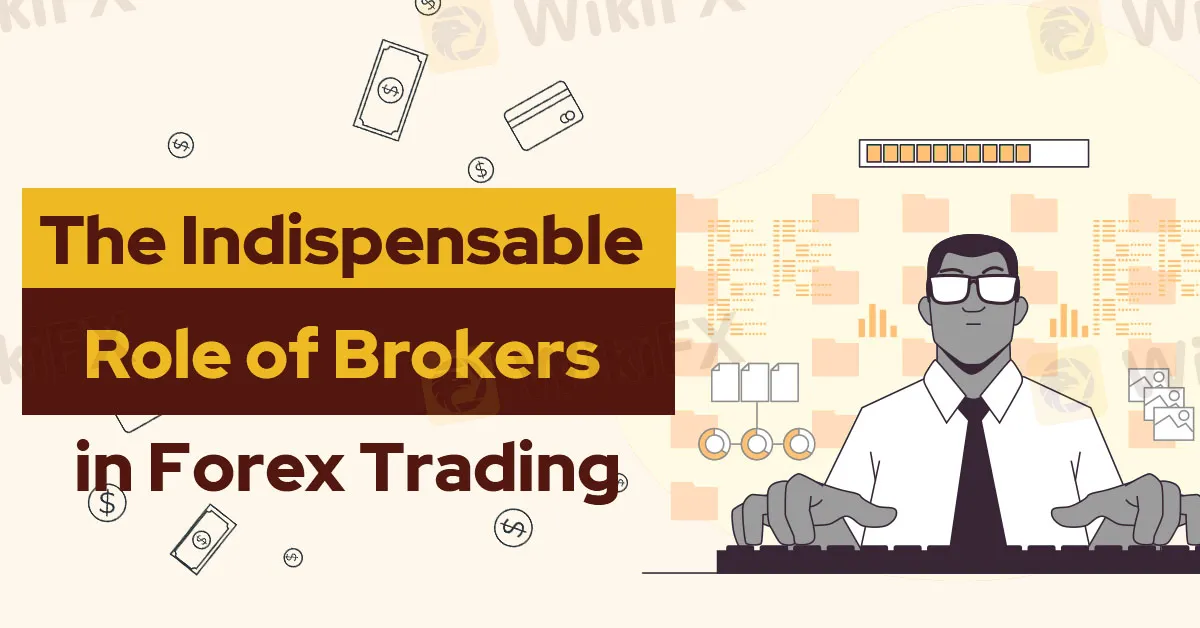简体中文
繁體中文
English
Pусский
日本語
ภาษาไทย
Tiếng Việt
Bahasa Indonesia
Español
हिन्दी
Filippiiniläinen
Français
Deutsch
Português
Türkçe
한국어
العربية
The Indispensable Role of Brokers in Forex Trading
Abstract:Forex trading, a dynamic and potentially lucrative endeavor, is often viewed as a solitary journey of individual investors navigating the vast financial markets. However, beneath this perception lies a fundamental truth: traders cannot trade effectively without a broker. These intermediaries, far from being mere facilitators, play an indispensable role in the intricate tapestry of Forex trading. Here’s why traders simply cannot do without a broker.

Forex trading, a dynamic and potentially lucrative endeavor, is often viewed as a solitary journey of individual investors navigating the vast financial markets. However, beneath this perception lies a fundamental truth: traders cannot trade effectively without a broker. These intermediaries, far from being mere facilitators, play an indispensable role in the intricate tapestry of Forex trading. Heres why traders simply cannot do without a broker.
1. Access to the Financial Markets:
Forex brokers act as gateways to the global financial markets. They provide traders with the essential infrastructure needed to participate in currency exchange. Brokers are connected to major financial institutions and liquidity providers, enabling traders to access diverse currency pairs and execute trades swiftly. Without a broker, traders would lack the necessary channels to enter the market, severely limiting their trading opportunities.
2. Leverage and Margin Trading:
Brokers allow traders to leverage their capital, magnifying their trading power. Through margin trading, traders can control larger positions in the market with a relatively smaller amount of capital. This amplifies potential profits but also entails higher risks. Brokers facilitate this process, providing traders with the leverage they need to capitalize on market movements. Without brokers, the concept of leverage and margin trading would be inaccessible to individual traders.
3. Market Analysis and Research Tools:
Experienced traders rely on in-depth market analysis and research to make informed trading decisions. Brokers offer a myriad of analytical tools, charts, and indicators that assist traders in evaluating market trends and predicting price movements. These resources are essential for devising trading strategies and managing risk effectively. Brokers provide access to real-time data and research materials, empowering traders with the information needed to navigate the volatile Forex market.
4. Order Execution and Risk Management:
Brokers execute traders‘ orders in the market, ensuring that buy and sell transactions are carried out accurately and swiftly. Additionally, brokers offer risk management tools such as stop-loss and take-profit orders. These tools enable traders to automate their trades, setting predefined points to limit potential losses or secure profits. Brokers facilitate the seamless execution of these orders, enhancing traders’ control over their investments.
5. Regulatory Compliance and Security:
Reputable brokers operate under strict regulatory frameworks imposed by financial authorities. These regulations are designed to protect traders from fraud, ensure fair practices, and maintain market stability. Trading with a regulated broker provides a layer of security, assuring traders that their funds are held in segregated accounts and that the broker adheres to ethical standards. Trading without a broker exposes traders to significant risks, including falling victim to scams or unregulated entities.
In essence, brokers are the cornerstone of the Forex trading ecosystem. They empower individual traders by providing essential market access, analytical tools, order execution services, and regulatory protection. Attempting to trade without a broker is akin to navigating uncharted waters without a compass; its not just challenging but inherently risky. Traders rely on brokers not only for opportunities but also for the security and resources needed to thrive in the competitive world of Forex trading. As such, brokers remain the invaluable partners that enable traders to turn their aspirations into tangible financial achievements.

Disclaimer:
The views in this article only represent the author's personal views, and do not constitute investment advice on this platform. This platform does not guarantee the accuracy, completeness and timeliness of the information in the article, and will not be liable for any loss caused by the use of or reliance on the information in the article.
Read more

Can You Really Trust Offshore Brokers?
Offshore brokers have become a popular choice for traders around the world. They often promise low fees, high leverage, and access to global markets. Many traders see these benefits and decide to open accounts. But the big question remains: Can offshore brokers be trusted?

eToro has teamed up with Stocktwits to Expand Retail Trading Access
In a bold move to enhance retail traders' access to global financial markets, eToro has teamed up with Stocktwits, a popular social platform for retail traders. The collaboration, which integrates the power of social media with trading tools, will introduce new features designed to streamline trading and foster a more engaged community of investors.

Acuity Trading Integrates Its Cutting-Edge Tools with cTrader to Revolutionize Trading Experiences
Acuity Trading, a leading provider of trading signals and research, has announced the integration of its comprehensive suite of tools with the cTrader platform. This partnership is set to enhance decision-making and revolutionize the trading experience by delivering powerful data and analytics directly to brokers and traders.

Why a Broker’s Customer Service Matters More Than You Think
Many traders focus on regulation when choosing a broker. While this is important, it is not enough. A broker's customer service can be just as vital. If you cannot reach support when you need help, it could lead to problems.
WikiFX Broker
Latest News
How Often Do U.S. Recessions Impact Online Trading Trends?
Scam Impersonating U.S. Treasury Token Issuance Spreads on Social Media
Naira Falls Against Dollar as Nigeria Reshapes Economic Blueprint
FCA Plans to Transform Financial Regulations in the UK
Is eToro Leaving London to Focus on a $5B U.S. IPO in 2025?
Twelve U.S. States Advance Strategic Bitcoin Reserve Legislation
ChatGPT down as thousands report issues worldwide
Oscars 2025: Nominations list in full
NBI Busts Crypto and Phishing Scam Operation in Parañaque City
Doo Prime Officially Launches Trading for OFFICIAL TRUMP (TRUMP/UST)
Currency Calculator






